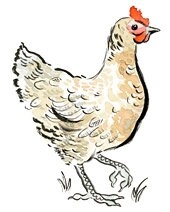
Michael Pollan, author, activist and professor of journalism at the University of California-Berkeley, has been speaking out about food, nature and culture for over 25 years. In 2010 he was named to the TIME 100, the magazine’s annual list of the world’s 100 most influential people. Here he offers common sense answers to some frequently asked food questions.
Should I buy local foods or stick to organic?
It depends on what you value most. If keeping pesticides out of your food is your highest value, then buy organic. If you care most about freshness and quality or keeping local farms in business and circulating money in your community, buy local. But very often you can do both. Some local farmers are organic in everything but name, so before you decide to pass them up, ask them not “Are you organic” – to which the answer must be no if they haven’t been certified – but rather, how do you deal with fertility and pests? That starts a more nuanced conversation that may convince you to buy their produce.
We can’t afford to buy all our produce organic, so where should we direct our money to get the most benefit?
On produce, some items, when grown conventionally, have more pesticide residue than others, so when buying these, it pays to buy organic. According to the Environmental Working Group, the “dirty dozen” most pesticide-laden fruits and vegetables are: apples, celery, strawberries, peaches, spinach, imported nectarines, imported grapes, sweet bell peppers, potatoes, blueberries, lettuce and kale/collards. The “clean 15” are onions, sweet corn, pineapples, avocado, asparagus, sweet peas, mangoes, eggplant, cantaloupe, kiwi, cabbage, watermelon, sweet potatoes, grapefruit and mushrooms. So if you’ve only got a little money to devote to organic, buy the organic apples and skip the organic onions. But do keep in mind that it’s important to eat a wide variety of fruits and vegetables regardless of how they’re grown.
Why are vegetables and meat labeled “organic” so much more expensive than similar items without the “organic” label?
There are several reasons organic food costs more than conventional food. First, the demand for it exceeds the supply, and presumably, as more farmers transition to organic, the price will fall, though it will never match conventional prices. For one thing, organic farmers receive virtually no subsidies from the government. (European governments significantly subsidize the transition to organic; ours doesn’t.) But even on a level playing field, farming organically would probably remain more expensive. Farming without
chemicals is inherently more labor-intensive, especially when it comes to weeding. In animal agriculture, raising animals less intensively is always going to cost more.
Think about it this way: The “high” price of organic food comes a lot closer to the true price of producing that food – a price we seldom pay at the checkout. It’s important to remember that when you buy conventional food, many costs have been shifted – to the taxpayer in the form of crop subsidies, to the farmworker in the form of health problems and to the environment in the form of water and air pollution.
O.K., apart from a clearer conscience, what does the premium paid for organic food get you as a consumer? Organic food has little or no pesticide residues, and especially for parents of young children, this is a big deal. There is also a body of evidence that produce grown in organic soils often has higher levels of various nutrients. (But whether these are enough to justify the higher price is questionable.) Probably for the same reason, organic produce often tastes better than conventional (though a cross-country truck ride can obviate this edge).
So it’s possible to make a case to the consumer for the superiority of organic food – but the stronger case is to the citizen. Farming without synthetic pesticides is better for the soil, for the water and for the air – which is to say, for the commons. It is also better for the people who grow and harvest our food, who would much rather not breathe pesticides. Producing meat without antibiotics will also help stave off antibiotic- resistance. If you care about these things, then the premium paid for organic food is money well spent.
Are there real opportunities for consumers to make an impact on factory farming, unsustainable agriculture and animal cruelty?
Absolutely. As the market for humanely raised meat grew in recent years, the industry responded. The egg industry recently committed to an effort to phase out tightly confining cages for laying hens; some pork producers are phasing out gestation crates; McDonald’s has taken steps to ensure that the meat it buys is slaughtered more humanely; Chipotle now buys only humanely raised pork. There is no question that agribusiness responds to the “votes” of consumers on these issues. The food industry is terrified of you. And PETA!




